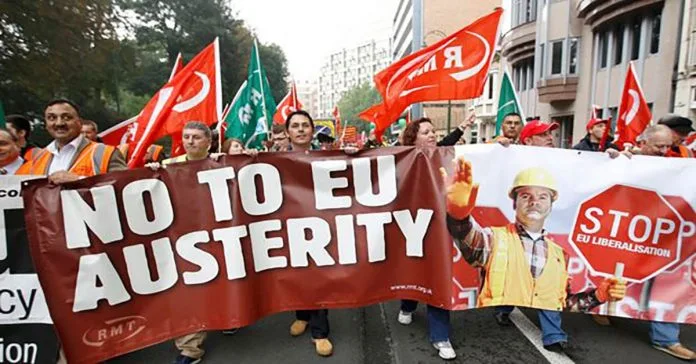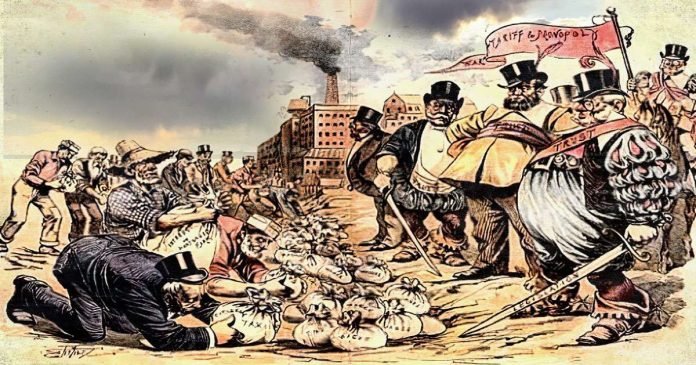Rejoining the EU? Not If You Care About Britain’s Working Class
The EU was never built for workers. It was designed by bankers, for bankers, with a rulebook written in the language of capital. Those pushing for a return to Brussels’ embrace, whether through Starmer’s “reset” or eventual ‘rejoin’, have conveniently forgotten that the loudest and most principled opposition to the European project once came from the democratic socialist tradition. Brexit Was a Working-Class Revolt Against the EU’s Neoliberal Empire
The Working Class Voted Out for a Reason
It wasn’t xenophobia or nostalgia that drove Brexit. It wasn’t racist pensioners or backward northerners who delivered Brexit, despite what metropolitan liberals claim. It was lived experience. The towns and cities that bore the brunt of deindustrialisation, where steelworks shut, pits closed, and factories vanished, voted Leave. These weren’t mindless protest votes. They were a clear-eyed rejection of a system that had gutted their communities while enriching London and Brussels.
For decades, the EU promised prosperity. What it delivered was stagnation, cheap labour undercutting wages, and a political class that told former engineers and miners to become coders or delivery drivers. These weren’t ignorant votes. They were calculated rejections of a system that had failed ordinary people for decades.
These communities understood what too many Remainers still refuse to admit: the EU helped write the script for Britain’s managed decline.
The EU’s Iron Cage of Neoliberalism

Let’s be blunt: EU membership makes genuine socialist policy impossible. Its treaties and directives enshrine neoliberalism as constitutional law. Its core directives are designed to prevent exactly what Britain’s working class needs:
- State aid rules make industrial revival through public ownership nearly impossible
- Competition law prevents governments from prioritising local and national businesses over multinationals.
- Fiscal rules like the Maastricht criteria force austerity, even in recession. Reducing public spending to 3% of GDP for government deficits and 60% of GDP for public debt. Set in the Stability and Growth Pact and enshrined in the EU Treaties.
- Free movement creates a race to the bottom for wages in many sectors, particularly the lower end.
This isn’t theoretical. When French railway workers protested against privatisation, they were told EU rules required it. When Greece elected a left-wing government promising to end austerity, the EU crushed them. When Italy tried to rescue failing banks, EU state aid rules hampered them.
The EU is neoliberalism carved into constitutional stone, designed specifically to be beyond the reach of democratic change. It isn’t a neutral platform. It’s a fortress of market orthodoxy, purpose-built to prevent the kind of democratic economic planning Britain now desperately needs.
Britain Needs Industrial Strategy, Not Free Trade

After decades of allowing the market to decide everything, Britain’s industrial base has been hollowed out. Nine of the ten poorest regions in Northern Europe are in the UK, a damning indictment of both EU membership and domestic policy failure.
What Britain needs isn’t Starmer’s craven crawl back to Brussels. It needs:
- A sovereign industrial strategy that rebuilds manufacturing in former industrial heartlands
- Public ownership of key utilities water, energy, and rail, without EU competition rules standing in the way
- Local and regional investment controlled by democratically accountable bodies, not distant EU commissioners
- Training and apprenticeships for British youth instead of importing skilled workers
- Immigration policies that serve national needs without undermining wages
- Migration policies that protect wages and integrate new arrivals fairly
- Skills and training for British youth, not endless reliance on imported labour
- Rebuilding manufacturing in the Midlands and North
None of this is possible inside the EU’s institutional straitjacket. EU rules are designed to prioritise cross-border capital flows over workers’ interests. Rules that prevent member states from doing precisely what Britain must now do.
The Left’s Forgotten Opposition
Before Brexit became a culture war, the strongest EU critics came from the socialist Left. Tony Benn warned that the EU transferred power “from those you can elect to those you cannot remove.” Jeremy Corbyn voted against every EU treaty that came before Parliament. Peter Shore condemned the “bankers’ Europe” being built at democracy’s expense.
These weren’t little Englanders or right-wing nationalists. They were socialists who understood that democracy and workers’ power must be defended at the national level before they can be extended internationally.
Building Something Better
Leaving the EU wasn’t a leap into the unknown. It was a refusal to be ruled by a system that had already failed us.
What comes next should not be isolationist, but independent. Not reactionary, but regenerative. Not protectionism, but strategic trade. Not xenophobia, but a migration system that serves the British working class rather than undermining it.
Remaining outside the EU’s restrictive framework gives Britain the freedom to:
- New manufacturing hubs in our former industrial heartlands
- A national investment strategy directed at levelling up beyond Westminster’s PR gimmicks
- Implement regional development without Brussels approval
- Protect strategic industries without violating competition law
- Design trade deals that benefit workers, not just corporations
- A second city built in the North to break the gravitational pull of London
- Energy, transport, and infrastructure projects that create real jobs and renew pride in place
These ambitions are not just necessary, they’re now possible. But only outside the EU. We have the freedom to build an economy that works for the many, not the few, exactly what the establishment fears most.
The Green Case for Made in Britain

There’s another powerful reason to rebuild our manufacturing base: the planet cannot sustain the insanity of global supply chains that ship everyday items thousands of miles for marginal cost savings.
The EU’s model of borderless trade isn’t just economically unsustainable, it’s environmentally catastrophic. Every plastic toy manufactured in Asia, every piece of furniture from Eastern Europe, every vegetable grown in Spain that could be grown here carries a carbon footprint that’s killing our future.
Brexit gives us the opportunity to build a genuinely green industrial strategy:
- Localised production that slashes transport emissions and shipping pollution
- Shorter supply chains that reduce vulnerability to global disruptions
- Circular economy initiatives free from restrictive EU procurement rules
- Strategic manufacturing of essential goods like medical supplies, energy components, and food
- Regional specialisation based on local skills and resources rather than global race-to-the-bottom competition
We cannot be a nation of shopkeepers if the nation doesn’t make the goods to sell. The EU’s borderless market has turned Britain into a consumption economy dependent on imports and financial services, neither of which provides secure, well-paid jobs for working-class communities.
If Trump’s trade wars have taught us anything, it’s that a country needs not only to be sustainable but to sustain itself. Nations that cannot produce essential goods become subordinate to those that can. The globalist monster feeds on dependency, which is precisely what the EU’s model creates.
True environmental sustainability cannot be achieved through consumer guilt trips and carbon offsets. It requires fundamental restructuring of how and where we produce the things we need. Making what we use, close to where we use it, isn’t just common sense, it’s the only path to genuine sustainability.
Brexit Was Just the Start: The Case for a Sovereign, Socialist Britain
As Starmer schemes in Brussels, Britain’s working class faces a clear choice: accept a gradual return to EU subordination, complete with its job-destroying neoliberalism, or demand a truly independent economic strategy that puts British workers first.
The EU offers nothing to the communities it already failed. It promises only more of the same: deindustrialisation dressed as progress, exploitation marketed as opportunity, and poverty rebranded as flexibility.
What Britain needs isn’t more empty rhetoric about “levelling up” or powerless metro mayors with fancy titles but no real funding. We need genuine transformation: roads, railways, and digital infrastructure fit for the 21st century. We need investment in the North that goes beyond London politicians’ photo opportunities and actually rebuilds communities gutted by decades of neglect.
This isn’t difficult, it just takes political will. Unfortunately, successive governments, Labour and Conservative alike, have found it impossible to think beyond the M25. Their vision extends only as far as the suburbs of the capital, while the rest of the country crumbles.
Why not build a new second city in the heart of our former industrial heartlands? Why not create manufacturing hubs that produce the goods we use, here in Britain, by British workers earning decent wages? Why not establish regional investment banks that put local development over London profits?
The EU’s rigid framework makes such ambition nearly impossible. Its state aid rules, competition law, and fiscal constraints are designed to prevent exactly this kind of transformative national investment. Breaking free from Brussels gives us the chance to rebuild Britain according to the needs of its people, not the demands of transnational capital.
Britain’s workers deserve better than to be sacrificed on the altar of European integration once again. They need a government that fights for them, not for the approval of unelected bureaucrats in Brussels.
The EU never worked for Britain’s working class. It’s time to build something that does.
Support Independent Journalism Today
Our unwavering dedication is to provide you with unbiased news, diverse perspectives, and insightful opinions. We're on a mission to ensure that those in positions of power are held accountable for their actions, but we can't do it alone. Labour Heartlands is primarily funded by me, Paul Knaggs, and by the generous contributions of readers like you. Your donations keep us going and help us uphold the principles of independent journalism. Join us in our quest for truth, transparency, and accountability – donate today and be a part of our mission!
Like everyone else, we're facing challenges, and we need your help to stay online and continue providing crucial journalism. Every contribution, no matter how small, goes a long way in helping us thrive. By becoming one of our donors, you become a vital part of our mission to uncover the truth and uphold the values of democracy.
While we maintain our independence from political affiliations, we stand united against corruption, injustice, and the erosion of free speech, truth, and democracy. We believe in the power of accurate information in a democracy, and we consider facts non-negotiable.
Your support, no matter the amount, can make a significant impact. Together, we can make a difference and continue our journey toward a more informed and just society.
Thank you for supporting Labour Heartlands









